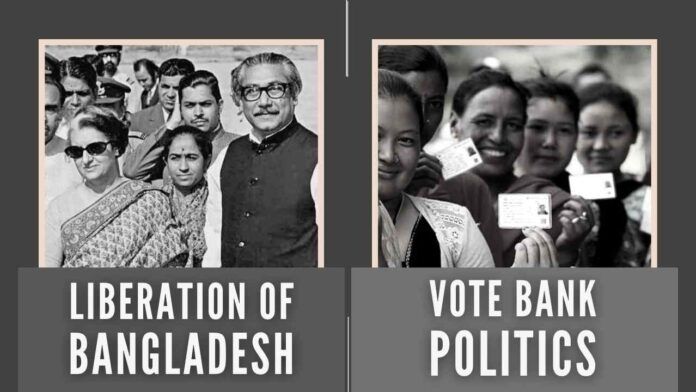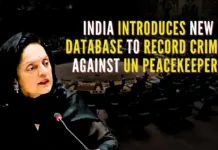
India and the Liberation of Bangladesh
16th December is celebrated as Victory day of Bangladesh and India jubilates it as a diplomatic achievement for outsmarting Pakistani military forces. Atal Bihari Vajpayee reportedly praised Indira Gandhi for changing geography too, along with a history for dividing Pakistan into two parts. A plethora of literature is availably eulogizing the strategic acumen of Indira Gandhi, however, few scattered dots are yet to be tractioned to extrapolate a larger game plan. The victory of Bangladesh had far more negative implications on Indian demography, polity, and economy than any other country, therefore being Indian we should stop celebrating Bangladesh as a red-letter day because it orchestrates myopia on our part.
The creation of Bangladesh was destined due to the atrocities perpetrated by Pakistan in Bangladesh or East Pakistan as it was called the then. India only facilitated its liberation by providing necessary ammunition to the resolve of Bangladeshis, but was it propitious for India in any sense? What were the consequences after the establishment of Bangladesh as an independent nation? Could we achieve any strategic or diplomatic control over Bangladesh? Why did India fail to stop illegal migration and successful deportation of Bangladeshis who entered or stayed in India illegitimately? All in all, India was at the receiving end in this entire metamorphosis.
Shaikh Mujibur Rahman or as he was fondly called ‘Bongo Bondhu’ was a leader of this East Pakistan liberation movement and he became the first president of the newly created Bangladesh. In order to understand any agitation first and foremost necessity is to read the mind of its leader and by this rule, the ideological plankton of S M Rahman is required to be appreciated. His cryptic intentions were visible when he voiced his design as to northeast India summarized as follows “The huge population of Bangladesh is an asset. Assam is full of forest resources. Also, Assam has abundant resources in the coal and petroleum sector which is why Assam must be part of East Pakistan then only the economy of East Pakistan would prosper….” Remember, by the time of his expression independent Bangladesh was yet to see the light of the day.
The Quint published an article by retired diplomat Sashanka Banerjee recalling his meeting with ‘Bongo Bondhu’, in this article he mentions that India supported the Bangladeshi struggle for independence from the Jawaharlal Nehru era with the insistence on the ideals of Bengali nationalism, anchored on secularism; pluralist democratic movement, and non-violence[1]. This emphasis remain constant during the reign of Indira Gandhi, however, after independence ‘Bongo Bondhu’ desired to have a name of the new nation as the ‘Islamic Republic of Bangladesh’ nevertheless India spurned these efforts and under the pressure of Indian authorities Bangladesh was declared the ‘People’s Republic of Bangladesh’. This warning bell went unheard by the Indian authorities either intentionally or unintentionally and it had been just the beginning of an avalanche by the father of Bangladesh. According to author Muhammad Tajuddin, after the formation of Bangladesh, one of the politico-security objectives of the Shaikh government was to “create and maintain pro-India-Bangladesh co-operation lobbies in the provincial capitals bordering Bangladesh particularly West Bengal and Tripura, where it has separate missions’.
Rulers in Bangladesh nonetheless its ‘Father of the nation’ had a meticulous mechanism in their mind to infiltrate into India, mend local population and politicians in pro-Bangladesh apparatus and capture northeast Indian territory for their own benefit by establishing another Islamic nation on the eastern rim of India. A question arises, therefore is how come Indian authorities were naïve of these ill-motives of Bangladeshi leaders or was it a devious plan of the then-incumbent Indian government to broaden a canvass of vote bank in the northeast region. The analysis of this issue points a finger to the latter.[2]
Illegal infiltration in Assam became a boiling issue. Livelihood, security, demography, and resources were under constant threat of illegal migrants. All Assam Students Union (AASU) started agitation against the plight of indigenous Assamese and instead of lending support to it Congress under the Indira Gandhi government provided aid and assistance to ‘All Assam Minority Students Union’ (AAMSU) to neutralize AASU. AAMSU was at the forefront in the communal division of state and this had a domino effect in every corner of Assam. By taking a cue from AAMSU another pro-minority organization, namely, ‘All Bodoland Minority Students Union’ (ABMSU) raised its ugly head against ‘All Bodoland Students Union’ (ABSU) and the then Congress leadership never stopped supporting these dangerous offshoots. Now all these anti-national forces are acting in unison to oppose ‘National Citizens Register’ (NRC) and this menace is not limited to Assam, in Nagaland too on any Muslim religious day at 50% shops in Kohima and 75% shops, in Dimapur remain closed. It is observed by some reports that the areas in Dimapur already look like mini-Bangladesh.
The Congress government at the Centre under the leadership of Rajiv Gandhi signed the Assam accord in 1985 in such shallow and vague terms that detection and deportation of foreign nationals turned ineffective. A visible imprudence by the litany of Congress leaders in handling the issue of illegal infiltration, particularly in northeast India establishes direct linkage between vigorous Indian back up to Bangladesh emancipation and subsequent somnolence in the eviction of foreigners.
The issue of Bangladeshi settlements is not new, in fact, it is an oft peddled argument with a substance that this has happened since even before independence. Jawaharlal Nehru and Rajendra Prasad were very well aware of this snag, however, no Congress leader showed the grit to prevent and evict illegal squatters from Indian land. A statistics testify unprecedented growth of 100% in some of the constituencies in the northeast and much to our dismay, neither state government nor election commission undertook a mission to cleanse the highly infested constituencies in fact election commission, state government, and the central government remains satisfied with passing a buck at each other’s doorstep. Outright flouting of the Constitutional rights of the citizens became a dime a dozen. A press note number 88 dated 18th September 1979 by the Assam government published instructions in the following words “The commission has instructed that no person whose name was included in the electoral roll should be eliminated on the ground of citizenship as the process of establishing whether a person is a citizen or not is time-consuming”. After three decades the commission failed to act till 2016 and the fate of six lakh objections against the inclusion of names of foreigners in the electoral roll is still hanging fire. A fact need to be mentioned unflinchingly is that Congress enjoyed a fruit of power in Assam for most of the time unto 2016.
Action in Liberation of Bangladesh and inaction in fending off northeast India from the relentless insurgence has a smack of conspiracy for petty political objectives. On every occasion, Bangladeshi politicians outwitted Indian counterparts and gradually disregarded all the promises given to India to seek her help in their struggle against Pakistan. Bangladeshi establishment has adroitly avoided signing any repatriation treaty with India, which could have imposed onerous responsibility on them to take back their citizens. The agony of Hindus in Bangladesh is falling on deaf ears of dispensation in Bangladesh and this is not a new phenomenon. The book “Dead Reckoning-Memories of the 1971 Bangladeshi War“ by Sarmila Bose contained an independent chapter called ‘Hounding of Hindus – The Politics of Minority persecution’ recounting the hatred suffered by Hindus at the hands of local Bengali Muslims in East Pakistan and how the Awami League (Ruling Party) chose to be a silent bystander in these inhuman decimations hence, India failed to achieve anything by creating a separate Bangladesh rather we are paying heavily for it.
Wrong interpretation and presentation of history are causing injustice to our motherland. Flanked discussion by neglecting obvious conclusions is uncharitable and equally detrimental to our national interest. One thing which we all should remember is that history should not be turned into hagiography and the only way to ensure this is to use a tool of constant appraisal of established narrative.
Note:
1. Text in Blue points to additional data on the topic.
2. The views expressed here are those of the author and do not necessarily represent or reflect the views of PGurus.
References:
[1] Mujibur Rahman’s First Secret Meeting with an Indian Officer — Me – Mar 17, 2020, The Quint
[2] Operation Lebensraum: Illegal Migration from Bangladesh Paperback – Mar 18 2018, Amazon.in
Note:
1. Text in Blue points to additional data on the topic.
2. The views expressed here are those of the author and do not necessarily represent or reflect the views of PGurus.
Reference:
[1] Operation Lebensraum-Illegal Migration From Bangladesh by Hiranya Kumar Bhattacharya
PGurus is now on Telegram. Click here to join our channel and stay updated with all the latest news and views
For all the latest updates, download PGurus App.
- Is hijab really essential in Islam? - March 4, 2022
- Liberation of Bangladesh and vote bank politics - December 2, 2021
- Let us keep our powder dry against Sri Lanka - June 15, 2021










